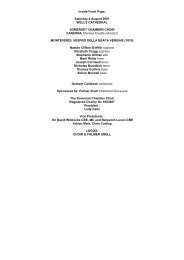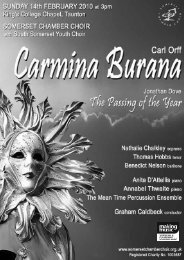Prayer IJesu that dost in Mary dwell,Be in thy servants’ hearts as well,In <strong>the</strong> spirit of thy holiness,In <strong>the</strong> fullness of thy force and stress,In <strong>the</strong> very ways that thy life goes,And virtues that thy pattern shows,In <strong>the</strong> sharing of thy mysteries;And every power in us that isAgainst thy power put under feetIn <strong>the</strong> Holy Ghost <strong>the</strong> ParacleteTo <strong>the</strong> glory of <strong>the</strong> Fa<strong>the</strong>r. Amen.Rosa mystica‘The Rose is a Mystery’- w<strong>here</strong> is it found?Is it anything true? Does it grow upon ground?It was made of earth’s mould, but it went from men’s eyes,And its place is a secret, and shut in <strong>the</strong> skies,In <strong>the</strong> Gardens of God, in <strong>the</strong> daylight divineFind me a place by <strong>the</strong>e, Mo<strong>the</strong>r of mine.But w<strong>here</strong> was it formerly? Which is <strong>the</strong> spotThat was blest in it once, though now it is not?It is Galilee’s growth; it grew at God’s willAnd broke in<strong>to</strong> bloom upon Nazareth Hill.In <strong>the</strong> Gardens of God, in <strong>the</strong> daylight divineI shall look on thy loveliness, Mo<strong>the</strong>r of mine.Tell me <strong>the</strong> name now, tell me its name:The heart guesses easily, is it <strong>the</strong> same?Mary, <strong>the</strong> Virgin, well <strong>the</strong> heart knows,She is <strong>the</strong> Mystery, she is that Rose.In <strong>the</strong> Gardens of God, in <strong>the</strong> daylight divineI shall keep time with <strong>the</strong>e, Mo<strong>the</strong>r of mine.Is Mary that Rose, <strong>the</strong>n? Mary, <strong>the</strong> Tree?But <strong>the</strong> Blossom, <strong>the</strong> Blossom t<strong>here</strong>, who can it be?Who can her Rose be? It could be but One:Christ Jesus, our Lord—her God and her Son.In <strong>the</strong> gardens of God, in <strong>the</strong> daylight divine,Show me thy Son, Mo<strong>the</strong>r, Mo<strong>the</strong>r of mine.Does it smell sweet, <strong>to</strong>o, in that holy place?Sweet un<strong>to</strong> God and <strong>the</strong> sweetness is grace;The breath of it ba<strong>the</strong>s great heaven above,In grace that is charity, grace that is love.To thy breast, <strong>to</strong> thy rest, <strong>to</strong> thy glory divineDraw me by charity, Mo<strong>the</strong>r of mine.God’s grandeurThe world is charged with <strong>the</strong> grandeur of God.It will flame out, like shining from shook foil;It ga<strong>the</strong>rs <strong>to</strong> a greatness, like <strong>the</strong> ooze of oilCrushed. Why do men <strong>the</strong>n now not reck his rod?Generations have trod, have trod, have trod, have trod;And all is seared with trade; bleared, smeared with <strong>to</strong>il;And wears man’s smudge and shares man’s smell: <strong>the</strong> soilIs bare now, nor can foot feel, being shod.And for all this, nature is never spent;T<strong>here</strong> lives <strong>the</strong> dearest freshness deep down things;And though <strong>the</strong> last lights off <strong>the</strong> black West wentOh, morning, at <strong>the</strong> brown brink eastward, springs -Because <strong>the</strong> Holy Ghost over <strong>the</strong> bentWorld broods with warm breast and with ah! Bright wings.Prayer IIThee, God, I come from, <strong>to</strong> <strong>the</strong>e go,All day long I like fountain flowFrom <strong>the</strong> hand out, swayed aboutMote-like in thy mighty glow.What I know of <strong>the</strong>e I bless,As acknowledging thy stressOn my being and as seeingSomething of thy holiness.Once I turned from <strong>the</strong>e and hid,Bound on what thou hadst forbid;Sow <strong>the</strong> wind I would; I sinned:I repent of what I did.Bad I am, but yet thy child.Fa<strong>the</strong>r, be thou reconciled.Spare thou me, since I seeWith thy might that thou art mild.I have life before me stillAnd thy purpose <strong>to</strong> fulfil;Yea a debt <strong>to</strong> pay <strong>the</strong>e yet:Help me, sir, and so I will.O Deus, ego amo teO God, I love <strong>the</strong>e, I love <strong>the</strong>e -Not out of hope of heaven for meNor fearing not <strong>to</strong> love and beIn <strong>the</strong> everlasting burning.Thou, thou, my Jesus, after meDidst reach thine arms out dying,For my sake sufferedst nails and lance,Mocked and marred countenance,Sorrows passing number,Sweat and care and cumber,Yea and death, and this for me,And thou couldst see me sinning:Then I, why should not I love <strong>the</strong>e,Jesu, so much in love with me?Not for heaven’s sake; not <strong>to</strong> beOut of hell by loving <strong>the</strong>e;Not for any gains I see; But just <strong>the</strong> way that thou didst meI do love and I will love <strong>the</strong>e:What must I love <strong>the</strong>e, Lord, for <strong>the</strong>n?For being my king and God. Amen.The soldierYes. Why do we all, seeing of a soldier, bless him? blessOur redcoats, our tars? Both [of] <strong>the</strong>se being, <strong>the</strong> greater part,But frail clay, nay but foul clay. Here it is: <strong>the</strong> heart,Since, proud, it calls <strong>the</strong> calling manly, gives a guessThat, hopes that, makes believe, <strong>the</strong> men must be no less;It fancies, feigns, deems, <strong>the</strong> artist after his art;And fain will find as sterling all as all is smart,And scarlet wear <strong>the</strong> spirit of war t<strong>here</strong> express.But Christ our King. He knows war, served this soldiering through;He of all can handle a rope best. T<strong>here</strong> he bides in blissNow, and seeing somew<strong>here</strong> some man do all that man can do,For love he leans forth, needs his neck must fall on, kiss,And cry ‘O Christ-done deed! So God-made-flesh does <strong>to</strong>o:Were I come o’er again’ cries Christ ‘it should be this’.- 10 -
I have desired <strong>to</strong> goW<strong>here</strong> springs not fail,To fields w<strong>here</strong> flies no sharp and sided hailAnd a few lilies blow.Heaven-HavenA nun takes <strong>the</strong> veilAnd I asked <strong>to</strong> beW<strong>here</strong> no s<strong>to</strong>rms come,W<strong>here</strong> <strong>the</strong> green swell is in <strong>the</strong> havens dumb,And out of <strong>the</strong> swing of <strong>the</strong> sea.Interval (15 minutes)Gerard Manley Hopkins (1844–1889)ParryMy soul, t<strong>here</strong> is a country (from Songs of Farewell)Charles Hubert Hastings Parry and Charles Villiers Stanford rose above <strong>the</strong> insularmediocrity of <strong>the</strong> British musical establishment, exemplified in most ca<strong>the</strong>drals of <strong>the</strong> time.Parry’s and Stanford’s prodigious musical abilities, <strong>to</strong>ge<strong>the</strong>r with <strong>the</strong>ir wide-rangingintellects, energetic personalities and cosmopolitan outlook fostered by study abroad,allowed <strong>the</strong>m <strong>to</strong> escape from <strong>the</strong> shadows of Mendelssohn and Spohr, and thus <strong>to</strong> lay <strong>the</strong>foundations of a British musical renaissance.The six Songs of Farewell were composed between 1913 and 1917 - under <strong>the</strong> clouds of warand <strong>to</strong>wards <strong>the</strong> end of Parry’s life. The motets evoke a noble and elegiac <strong>to</strong>ne that seems<strong>to</strong> recall <strong>the</strong> late masterworks of Brahms. In My soul, t<strong>here</strong> is a country, Parry’s concern foraccurate and sympa<strong>the</strong>tic verbal accentuation is evident throughout this setting. Whilst thissetting of Henry Vaughan’s text is <strong>the</strong> most sectional motet of <strong>the</strong> set, <strong>the</strong> congruence of poetry and music is such thatthis never detracts from <strong>the</strong> poem’s overall sense of direction.My soul, t<strong>here</strong> is a countryFar beyond <strong>the</strong> stars,W<strong>here</strong> stands a winged sentryAll skilful in <strong>the</strong> wars:T<strong>here</strong>, above noise and danger,Sweet Peace sits crown'd with smiles,And One born in a mangerCommands <strong>the</strong> beauteous files.He is thy gracious Friend,And - O my soul, awake! -Did in pure love descendTo die <strong>here</strong> for thy sake.If thou canst get but thi<strong>the</strong>r,T<strong>here</strong> grows <strong>the</strong> flower of Peace,The Rose that cannot wi<strong>the</strong>r,Thy fortress, and thy ease.Leave <strong>the</strong>n thy foolish ranges;For none can <strong>the</strong>e secureBut One who never changes -Thy God, thy life, thy cure.Henry Vaughan (1622-95)GraingerBrigg FairPercy Grainger was an Australian-born composer, arranger and pianist. In <strong>the</strong> course of a longand innovative career he played a prominent role in <strong>the</strong> revival of interest in British folk musicin <strong>the</strong> early years of <strong>the</strong> 20th century. He also made many adaptations of o<strong>the</strong>r composers'works. Although much of his work was experimental and unusual, <strong>the</strong> piece with which he ismost generally associated is his piano arrangement of <strong>the</strong> folk-dance tune Country Gardens.Grainger left Australia at <strong>the</strong> age of 13 <strong>to</strong> attend <strong>the</strong> Hoch Conserva<strong>to</strong>ry in Frankfurt. Between1901 and 1914 he was based in London, w<strong>here</strong> he established himself first as a society pianistand later as a <strong>concert</strong> performer, composer and collec<strong>to</strong>r of original folk melodies. As hisreputation grew he met many of <strong>the</strong> significant figures in European music, forming importantfriendships with Frederick Delius and Edvard Grieg. He also became a champion of Nordic music and culture, hisenthusiasm for which he often expressed in private letters. In 1914 Grainger moved <strong>to</strong> <strong>the</strong> United States, w<strong>here</strong> he livedfor <strong>the</strong> rest of his life.In 1905, inspired by a lecture given by <strong>the</strong> pioneer folksong his<strong>to</strong>rian Lucy Broadwood, Grainger began <strong>to</strong> collect originalfolksongs. Starting at Brigg in Lincolnshire, over <strong>the</strong> next five years he gat<strong>here</strong>d and transcribed more than 300 songsfrom all over <strong>the</strong> country, including much material that had never been written down before. From 1906 Graingerused a phonograph, one of <strong>the</strong> first collec<strong>to</strong>rs <strong>to</strong> do so, and by this means he assembled more than 200 Edisoncylinder recordings of native folk singers.- 11 -












